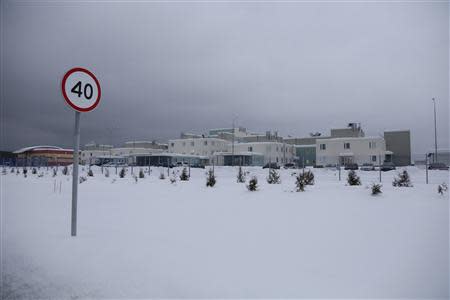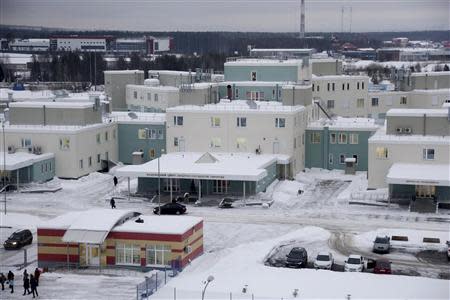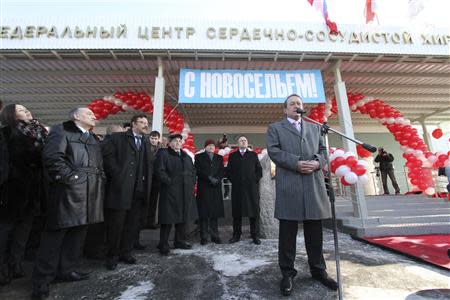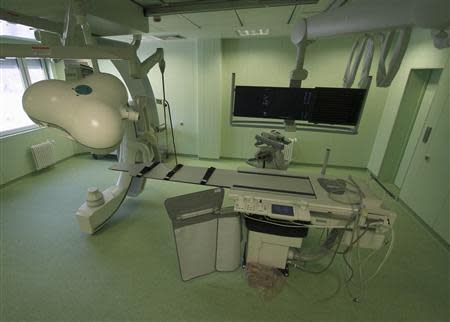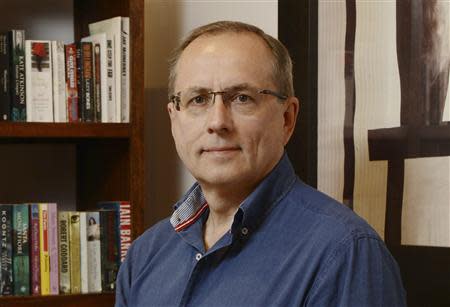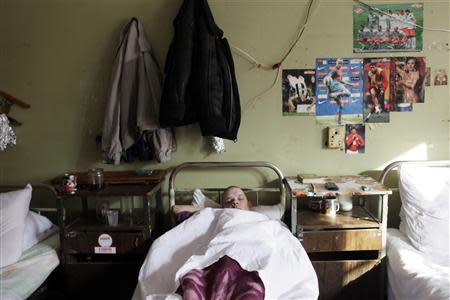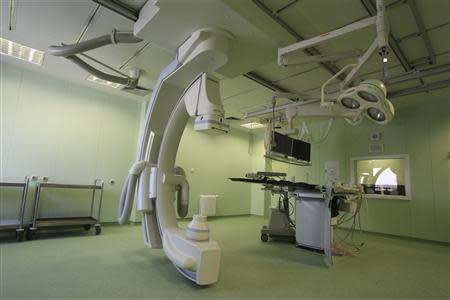Special Report: How Putin's associates botched state hospital project
(This is the second story of a series, Comrade Capitalism. See http://www.reuters.com/investigates/russia/) By Jason Bush, Elizabeth Piper, Stephen Grey and Maria Tsvetkova PERM, Russia (Reuters) - At the foot of the Ural Mountains stands a symbol of how even the best intentions in Russia can enable well-connected individuals to bleed money from the state. It's a modern hospital built in this industrial city of a million people, and intended to be a flagship of a grand project to improve the country's healthcare. The hospital's chain-smoking director, Sergei Sukhanov, loves his new facility, the Federal Centre for Cardiovascular Surgery, which has beds for 167 patients. He also admires Russian President Vladimir Putin, who championed the hospital and whose letter of thanks to the surgeon adorns his office. "It's a huge gift to the Perm region," said Sukhanov in his new white office. "It's like we've moved from a one-bedroom apartment to a five-bedroom apartment." But a Reuters investigation shows the hospital, and a $1 billion construction project of which it was part, were also business opportunities for Putin's allies. While it isn't clear whether they managed to turn a profit, their involvement cost Russian taxpayers dearly. A previous article detailed how two associates of Putin profited from selling high-tech medical equipment to the Russian state and sent money to Swiss bank accounts linked to the building of a lavish estate near the Black Sea. Those two men, Nikolai Shamalov and Dmitry Gorelov, also had stakes in two companies that received contracts to build a series of hospitals around Russia. The undertaking later led to accusations of "unjust enrichment" against one of the companies. That company ended up going bust, owing around 860 million rubles ($26 million) to the state. Hundreds of people lost their jobs. Corporate records show there was another major investor in the two building companies: Rosinvest, a Russian investment firm owned by offshore entities. In 2010 Sergei Kolesnikov, a businessman who used to work with the two Putin associates, went public with a claim that Rosinvest was ultimately controlled by the Russian leader himself. The role of Rosinvest in Putin's $1 billion health project, however, hasn't been previously reported. Kolesnikov says that Putin owned an offshore entity called Lirus Investment Holding, which had ultimate control of Rosinvest. He told Reuters that he knew this because he "participated in the creation" of Lirus. Lirus was a Liechtenstein company that, he said, was owned through bearer shares - securities that don't record the name of the owner. Putin owned 94 percent of the company, Kolesnikov said, while he, Shamalov and Gorelov owned 2 percent each. Kolesnikov said he was informed by both Gorelov and Shamalov that they had given Putin his bearer shares and that Putin had placed these in a safe. "The situation was specially done in such a way that nowhere would be anyone's signatures," Kolesnikov said. Kolesnikov said he helped to manage a portfolio of investments through Rosinvest on behalf of Shamalov, Gorelov and himself. But the prime beneficiary, he said, was Putin. Kolesnikov said he delivered reports about the investments to Shamalov, and that Shamalov presented them to Putin. Putin's ownership role in the project couldn't be confirmed. The Kremlin did not respond to Reuters questions about Rosinvest, which was liquidated in 2012. In the past, Putin's spokesman, Dmitry Peskov, has firmly denied any connection between Putin and Rosinvest. Shamalov and Gorelov did not respond to requests for comment on Kolesnikov's account. This series examines Russian capitalism in the Putin era. A complex system of reward and obligation has operated among the elite since Putin gained power in 2000, with associates of the president tapping into the flow of funds from state coffers. In addition to breeding corruption, this system carries another cost: bungling and waste. The project to create the string of hospitals wound up costing about $700 million more than Putin called for and delivered two fewer hospitals than planned. A state agency involved in steering the project went under, leaving behind debts of $300 million. The hospital money would have been better spent on simple outpatient healthcare than on high-tech facilities, some Russian healthcare specialists said. Despite a large number of state-run hospitals and an army of doctors, many Russians only get access to the healthcare they need by paying private clinics or bribing state doctors. Overall, Russians have seen only limited advances in the nation's medical care. Public-sector health spending in Russia remains low compared with the United Kingdom and other countries with government-financed healthcare: It equaled 3.7 percent of economic output in 2011, according to the World Bank. UK public spending on health was 7.7 percent of economic output that year. In the case of Putin's hospital scheme, say some specialists, Russian taxpayers overpaid for trophy structures that don't address the underlying causes of the nation's health crisis. "These projects are just about PR," said Kirill Danishevsky, a doctor and professor at Moscow's Higher School of Economics specializing in healthcare. "Russia didn't need new hospitals, and we certainly didn't need the number of scanners they bought. What Russia needs is primary healthcare." A SHARE OF THE ACTION It was in 2005 that Putin, then in his second term as president, initiated plans for Russia to spend $1 billion on 15 new medical centers for emergency, heart and prosthetic patients in cities spread across Russia, from Vladivostok in the east to Kaliningrad on the Baltic. Russian officials hired Cadolto, a German company skilled in a modular building technology, to provide the building blocks for seven centers. Officials granted the company a contract worth $270 million. But Putin insisted that some modules be built in Russia, not Germany, according to a Cadolto manager and Russian sources. That's where Shamalov and Gorelov came in. They were associates of Putin and, as detailed in a previous article, they supplied scanners to the hospitals at what some medical professionals said were inflated prices. Corporate records show the two men held stakes in two other companies that got involved in Putin's health project. These companies planned to build the next wave of medical centers, according to a former senior official overseeing the process and other sources familiar with the companies. The first was Rosmodulstroi, set up to build and own a module factory. The second company was St. Petersburg-based UK Modul, set up to manage the factory and handle contracts for supplying the modules to Putin's hospital project. Rosinvest - which Kolesnikov alleges was controlled by Putin - was a major investor in both companies. SHUT DOWN The German contractor Cadolto began to supply modules for local Russian contractors to put up the first seven hospitals. Meanwhile, the Russians set up a factory in Cherepovets, a city about 530 km (330 miles) north of Moscow, to produce their own modules. UK Modul got an initial contract from a Russian state agency in July 2008 to supply half the modules for a hospital in the city of Chelyabinsk. In September 2009, the Russian state designated $448 million for the construction of another five federal medical centers in addition to those being built with Cadolto's modules. Days later, DEZZ, the state agency then overseeing the health project, signed a further contract with UK Modul, according to court documents. Details of that UK Modul contract are not publicly available, and the court records don't specify the projects involved or the value of the deal. The company appears to have won a role in building half a dozen of the hospitals, however. Vadim Mozhaev, who was head of DEZZ at the time, told Reuters that UK Modul was given a contract for building "five or six (medical) centers." A St. Petersburg company, moreover, said on its website that it prepared project estimates for UK Modul for the Perm hospital and five other federal hospitals. DEZZ later updated its arrangements with UK Modul, specifying $97 million for the hospital at Perm, according to court documents. It also signed another contract with UK Modul for $15 million for supplying modules for a hospital at Smolensk. UK Modul failed to complete either project. In fact, it fulfilled its assignment at just one of the half-dozen hospitals it was engaged to build. The Perm job was a conspicuous flop. It took UK Modul more than a year to deliver all the modules, said Vladimir Sodomov, former deputy director of economics and procurement at Perm's Heart Institute, who helped oversee the building. The prefabricated blocks were meant to be put together like Lego bricks, but didn't fit because UK Modul had used the wrong plans, said one former executive at the company. "The holes weren't in the right place. The modules should fit together and onto the foundations perfectly, but they didn't," said the former executive, who declined to be named because he still works in the industry. "They (UK Modul) had no expertise." The problems were eventually resolved by another company, and the Perm hospital was completed in February 2012, almost a year after UK Modul had been replaced. Shamalov did not respond to written requests for comment. Gorelov declined to be interviewed, but sent a written statement in which he said: "I was a passive shareholder in the indicated companies. The business ideology and direct management of their activities was carried out by other shareholders, members of the board of directors and the directors of the companies. In connection with this I don't have information about the questions that interest you." Several former managers and employees at UK Modul said the Russian state was partly to blame for the Perm fiasco, because it did not pay bills on time. In February 2011, Viktor Rusanov took over as head of DEZZ, the agency overseeing the hospital project. He told Reuters that UK Modul failed to deliver on agreed tasks and "wanted yet more money." As problems mounted with UK Modul's work on the Perm hospital, DEZZ cut back UK Modul's state contracts. Eventually, in March 2011, it cancelled them altogether. Workers who turned up at the Cherepovets factory in March 2011 were greeted with a curt notice informing them it was closed. A subsequent letter from management told them that UK Modul had lost its government financing, leaving the company unable to pay wages and forcing it out of business. "Six hundred people worked in the factory, and they were simply chucked on the street," Gennady Smirnov, one of the workers, told Reuters. Smirnov said he and many other workers were not sent vital labor documents enabling them to seek work elsewhere or claim unemployment benefits. He said he was left out of work for a year and had to borrow money from his mother-in-law to pay the mortgage on his apartment. LATE AND EXPENSIVE Given the chaotic end to the efforts of Rosmodulstroi and UK Modul, it is hard to tell whether their shareholders made a profit on Putin's hospitals. What is clear is that the state felt it received poor value for money - so much so that it sued UK Modul for damages. The president's associates managed to complete just one of their half-dozen hospital projects, according to former UK Modul insiders - the deal to provide half the modules for the Chelyabinsk hospital. In the end, Russia imported more modules and built 13 of the planned 15 hospitals in Putin's grand health project. It took around five years longer than envisaged. Cadolto, unlike UK Modul, met its contracts and there is no suggestion it was responsible for any delays. The final cost to the Russian federal government for the project was about 70 percent more than first budgeted: $1.69 billion, according to official documents seen by Reuters. UK Modul wasn't the only problem. Two hospitals in which UK Modul wasn't involved failed completely. The hospital at Krasnodar was knocked down because mould ruined the modules after they had been installed. Another at Vladivostok was cancelled after delays and cost overruns. It was left to Russian taxpayers to clear up the mess. Technointorg, a state organization that oversaw the early phases of the hospital building program and the supply of medical equipment, ended up going bankrupt in September 2013. It left debts of more than $300 million. Its successor, DEZZ, sued UK Modul over its $97 million contract to build the Perm hospital. Judges upheld that claim and ordered UK Modul to pay $22 million. More than half of the amount was for "unjust enrichment" for failing to meet its obligations in terms of deadlines and standards, according to documents from the Moscow commercial court. UK Modul never made good on that money. The company went bankrupt in May 2012. Its assets, worth $26 million on paper, fetched $40,000. Russia's Ministry of Health did not answer questions about the financing and construction of the hospitals. But in a written statement it said: "Realizing the measures of the priority national project in the area of Healthcare actively encourages improvement of the demographic situation. The development of specialized, including high-technology, medical aid is one of the basic directions of the activity of the Ministry of Health and Social Development of the Russian Federation." Dashinevsky, the professor at the Higher School of Economics, said Russia's health system has suffered chronic underfunding for the last 10 to 15 years and become increasingly riddled with corruption and inefficiency. The botched hospital program, he said, helps explain why. "Healthcare is just one typical sector of the Russian economy. There is no special disease of healthcare," he said. "It's a general disease of the state." (Unless otherwise indicated, currency conversions at $0.0304 per ruble, and $1.374 per euro, the rates at the end of 2013) (Additional reporting by Brian Grow in Atlanta and Christian Hetzner in Nuremberg; Editing By Richard Woods and Simon Robinson)
